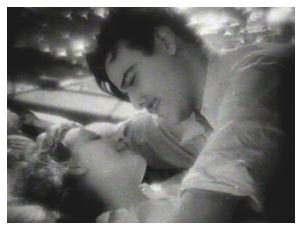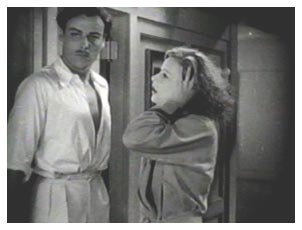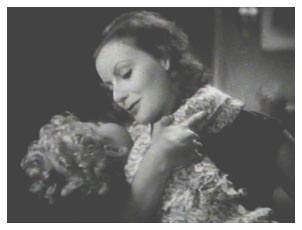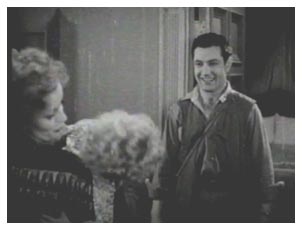

Directed by John S. Robertson
Distributed by Metro-Goldwyn-Myer
Cast: Greta Garbo (Arden Stuart), Nils Asther (Packy Cannon),
John Mack Brown (Tommy Hewlett), Dorothy Sebastian (Mercedes),
Lane Chandler (Ding Stuart), Robert Castle (Anthony Kendall),
Mahlon Hamilton (Mr. Glendening), Kathlyn Williams (Mrs. Glendenning)
Arden Stuart is tired of the double standard for men and
women - watching with amusement as some of her married male friends
drive up with several questionable lady friends in the car. She,
however, is pursued by the boyish and handsome Tommy Hewlett,
although he does not spark her interest - at least romantically.
She carries on a flirtation with the chauffeur, and when her brother
finds out, he fires the driver. Apparently hurt that he is looked
down on as inferior, in a rage he drives the car off an embankment
killing himself. Arden goes into months of depression finally
leaving the house one rainy evening to wander the city streets.
She happens upon an art exhibition and reception for Packy Cannon,
a former sailor and boxer who has become a talented and trendy
artist. The two fall for each other, and, defying convention,
she goes away with him on his yacht. After a long period sailing
the South Seas, Packy, for no apparent reason, tells Arden the
romance must end. She is heartbroken and goes back home, once
again, in a deep depression. She finally gives in to Tommy's persistence,
and they are married and have a little boy. Three years later,
Packy returns. When she encounters him, the passion is renewed,
and he asks her to leave with  him.
Will she leave her husband and child for the man she truly loves?
him.
Will she leave her husband and child for the man she truly loves?
Over 30 of Adela Rogers St. Johns' stories made it to film
either on the big screen or TV. She is best known for her close
relationship with so many of the big stars of the 1920's and 1930's,
writing about them in movie magazines while also creating her
fiction for magazines or books. She penned "The Single Standard"
as a serial in Cosmopolitan magazine. There is nothing
exceptional about her story; however it does become exceptional
on the screen solely as a result of Garbo being cast as the heroine,
Arden Stuart. Motion Picture Classic (1929) said it well
- and with a literary ferver, "The great Garbo bursts through
the drab grey ashes of this inferior story like a clean, white
flame leaping from volcanic vapors to the heights above."
The first real push for an equal rights amendment occurred in
1923. Although it took 60 years for this fight to reap results;
the ever-present double standard for men and women was a topic
for social commentary long before the 1960's. St. Johns delved
into this territory with her story, but it wasn't about equality
in the workplace. The opening of the film makes it very clear
that this commentary on equality had to do with sexual mores and
how attitudes differed for men and women when it came to associations
with the opposite sex.
The viewer is introduced to this double standard in the opening scene of the film. A large touring car pulls up in the driveway of Arden's magnificent Spanish-style home. Three men in tuxes are trying to pry themselves loose from a couple of clinging women - all of whom seem to have enjoyed an evening of alcohol and partying. One even leans out the window and kisses one of the men goodbye. Arden is on the expansive, open-air porch and observes this scene with a knowing half-smile. As the car drives away, the men start up the driveway. One spots Arden and says, "Holy smoke - there's a witness to the crime!"
Inside are a number of people, well-dressed, some playing cards, other lounging in the magnificent surroundings. Outside, Arden is obviously bored. After greeting their wives inside, one of the men returns to Arden. "I'll bet you saw a lot tonight - besides the moon!" he says. Arden laughs and assures him, " Don't worry. I shan't tell. I know lots more than that - about you men!" Pleased at the response, he tells her, "You're a good sport, Arden. A man would never need to lie to you." Thus we understand the significance of the movie's title - and anticipate the inevitable, that Arden will test society's acceptance of applying the same standard to both men and women.
Next, we are introduced to the one honorable man in Arden's world - Tommy Hewlett. Tommy is a boyish, good looking young man who has been in love with Arden for a long time. He sees an opportunity to be alone with her and comes out on the porch, somewhat nervously. He takes her hands in his, which is obviously as much show of affection as his respect for her and the opposite sex will allow. As a matter of fact, she twice pats him on the shoulder similar to the way two men would greet one another. She apologizes for leaving the party. "I'm sick of cards," she tells him. "I want life to be honest - exciting!" Suddenly turning serious, Tommy tells her, "I know I'm not exciting - but I love you!" - and then proclaims his oft-repeated request, "Arden - I wish you'd marry me -." Using no intertitles, her response is obvious - she brings a smile back to his face by playfully slapping at his hair to muss it, then turning him around and pushing him back toward the party.
It doesn't take long, however, for Arden to show us that she is willing to flaunt convention - not too seriously, of course - by carrying on a dalliance with the chauffeur, certainly someone far beneath her station. She signals him by flashing a light on the porch, and he drives up in a sports car. Arden, suddenly showing excitement rather than boredom, tells him to move over and take the wheel. Tommy arrives on the porch just in time to see them speed off. After a romantic interlude in the glow of a full moon on a hillside overlooking the ocean, they return.
The melodrama begins with intensity at this point as Arden's brother meets them in the driveway, furious at the audacity of the chauffeur to associate in such a way with his sister. "Get out of that car and pack your things!" he orders him. "You're leaving tonight!" Although Arden protests it was her fault, the chauffeur obeys the order and drives toward the garage. However, at the far end of the drive, he turns around and speeds the car past Arden and her brother toward the gate. At the last minute, he whips the wheel to the left rolling the car down an embankment and killing himself.
One can only suppose why a firing would bring about such a reaction. During their drive, Arden tells him to confess he's an ace aviator and the son of a Lord, and "they" will try to marry their daughters to him. Is she is telling him to make up a heroic or upper-class background for himself - or is this really who he is? His reply still leaves us unsure - "I'm no credit to the family. Your friendship is the first decent thing I've known since the war." Should we suppose he killed himself because he IS only a chauffeur with no pedigree of which to commend himself - and he's tired of being treated as a second-class citizen? The scene is dramatic, but it leaves the viewer with too many questions.
Arden goes into a mild depression over the next few months choosing to be alone and not associate with anyone. One rainy evening, she decides to put on a raincoat, take her umbrella, and walk into town.
What follows is a humorous and likeable scene where a middle-age
man comes up beside her as she's walking down the busy sidewalk,
tips his hand from the brim of his hat to say  "hello,"
and begins to walk with her. We don't know what the exchange of
words is until she finally turns to him and says, "I'm walking
alone because I want to walk alone!" However, he is not deterred
and actually takes her umbrella to hold over both of them. As
they reach a corner, she turns and walks across the street leaving
him standing and holding the umbrella. Although initially stunned,
the man smiles and walks away holding Arden's umbrella over his
head.
"hello,"
and begins to walk with her. We don't know what the exchange of
words is until she finally turns to him and says, "I'm walking
alone because I want to walk alone!" However, he is not deterred
and actually takes her umbrella to hold over both of them. As
they reach a corner, she turns and walks across the street leaving
him standing and holding the umbrella. Although initially stunned,
the man smiles and walks away holding Arden's umbrella over his
head.
Looking for a place to get out of the rain, Arden goes in to an art gallery where they are a number of people gathered. Earlier she had said she craved excitement. Here she finds it in the one who is the center of all of the attention at the gallery - Packy Cannon, whom we are told is an ex-sailor, ex-prizefighter and now an accomplished painter. Apparently St. Johns wanted her heroine's object of affection to be appealing on a variety of levels - not to mention good looks.
Arden, at Packy's invitation, gains entrance into a select circle of people who have been invited to socialize with him at the art gallery that evening long after its closing time. To continue to impress Arden, as well as emphasize his multi-talented appeal, one of his ex-prizefighter friends challenges him to a friendly boxing match with taunts that he's gone soft since becoming an artist. The crowd moves to a larger room to watch the event as both men strip down to their undershirts and put on boxing gloves. Of course, Packy knocks his friend out. Arden is duly impressed, and, of course, Packy is pleased to have "shown off" for her, as well. The only disconcerting part of the evening for Arden so far is when she learns he is sailing for the South Seas in the morning.
As expected, he asks her to stay after the others have gone, and they enjoy each other's company just talking in front of the fireplace. Arden is especially intrigued, though, when he tells her, "There are many theories about love -- but only one answer: equality -- and perfect freedom!" Obviously, she has found a man whose philosophies about love coincide with hers. However, the evening must come to an end. As they go to the door for her to meet the taxi on the street, he lifts her up in his arms, carries her to the taxi, places her in the back seat and kisses her. He asks her to meet him at 8 a.m. on his yacht, the "All Alone," and have breakfast before he sails. The next morning, she is there having breakfast, and, we are not surprised when he asks her to go with him . . . and she does!
Straight out of any romance novel, we see the two lovers, carefree, clinging to one another as Packy is at the ship's wheel, lying on the deck in the sun, swimming in a bay and playing like children in the water. Then an intertitle tells us, "Weeks . . . months . . . strange lands. . . lonely seas . . . the blazing Southern Cross . . . the fiery tropic sun . . ." Then, one day, Packy is sitting in a chair on the deck sketching, appearing to be very busy and serious, as Arden lies on the deck. She hears Packy tell the crew, "Reverse course." She goes to him, sitting at his feet and wrapping her arm around his leg. She looks up at him with deep concern on her face. "But you're not taking me home? We'll still go on - together?" Staring ahead blankly, he replies, "No, Arden. We must go on - alone." Once again, the story leaves some unanswered questions - we are given no reason for Packy's change of heart. If anything, his decision seems cold and frivolous, although it does elicit sympathy from the viewer for Arden.
What comes next is no surprise. Arden returns home, crushed, dejected - and, although she is talked about because of her scandalous fling - Tommy's love is blind to this, and he continues to petition her to marry him. . . and she, of course, agrees.
The story also becomes somewhat disjointed after Arden returns
home. There is a interlude, of sorts, between Tommy's pleas for
Arden to marry him and a jump in time to three years later when
they are married with a young son. Interjected between these two
is a segment that is introduced by the intertitle, "In the
fever haunted interior of China -." Packy is not well, and
we assume the grey streak he has developed in his hair is an indication
of the hardships he has endured. When he asks a crewman who is
with him in a desolate Chinese village how long they must travel
the river to reach the "All Alone," he is told a month.
As if pulling together all of the strength he can muster, he straightens
up, pats the crewman on the back and forges ahead. This dissolves
to Arden on the beach playing with her little boy. Why the China
interlude? The film doesn't make this clear, and all things considered,
it seems unnecessary to the continuity of the story - especially
the indications that he may have suffered from some sort of fever
while in China which has no bearing whatsoever on the  remainder
of the story.
remainder
of the story.
We are then shown a heartwarming scene as Arden seems to take great delight in playing with her son on the beach. Dad comes up, and the little boy runs to him - an idyllic picture of a happy family. However, when the beach ball they are throwing rolls through the large doorway leading into the hotel lobby, Arden goes to fetch it and encounters Packy in the lobby. There is an intense sparkle in their eyes as they are obviously delighted to see one another - yet the meeting is played well by its restraint. As they stand there looking at one another almost in disbelief, the little boy comes in and says, "Daddy says it's time to go home, Mama" - and, quite puzzlingly to the viewer - Arden hangs her head as if she is ashamed for Packy to know she is married with a son. Packy says nothing. Then Tommy walks in - glares at Packy as Arden introduces them - she still with her head bowed. They nod in greeting to one another - Tommy picks up the little boy and walks away. As Arden begins to leave, Packy grabs her by the arm. "Arden - I had to come back - I must see you!" She says nothing and walks away.
The film does pick up momentum here, and the intensity of emotion increases. One evening, there is a party near the docks, Arden slips away, goes out to Packy's yacht, and they make plans to leave together. Tommy is aware that Arden has done left the party to see Packy. Later, after she has returned, he gets a gun, goes out to the yacht and confronts Packy. The scene is very well played by Brown - maintaining a stern countenance, but never flaring eyes or nostrils in hyperbolic anger. To the credit of the story, it does throw us a twist that is not expected. As he holds the gun pointed at Packy, Tommy tells him to turn Arden away when she returns. Then, Tommy says he will go away on a hunting trip where there will be an accident, and Arden will be honorably free. "I won't have a scandal, Cannon. This time our emotions don't matter - there is a child to think of --."
Without revealing everything about the ending, let's just say the obvious happens - Arden does the honorable thing and returns to her husband - with the child being the pivotal "card" in this game. The problem with all this is that we apparently are supposed to revere Arden for doing taking the path of honor; howeer, the very fact that she went to Packy's yacht, fell passionately into his arms and declared she would follow him wherever he went does not endear her to us. After all, for a time, it DID seem she was willing to leave her child behind for a man who had already "dumped" her one time.
As noted before, the story is secondary to the star. It's pure soap opera, but Garbo will enchant the viewer for the film's somewhat brief 73 minutes easily. Garbo was definitely an accomplished emotional actress being extremely sexy without he buxomness or glitz that we so often see - and very capable of wringing the last tear from an emotionally wrenching scene, assuming an aloofness as no other actress could, and bringing "class" to each and every one of her silent films.
 Nils Asther is well-cast
as Packy Cannon. He, too, carries an aloofness - or maybe it's
a "cockiness" - that is required for the multitalented
ex-sailor, ex-boxer, artist that he portrays in the film. Asther's
looks would never qualify him as "rugged" - instead
having somewhat of a "pretty boy" appearance - but still
exhibiting the necessary masculinity (as a side note, though,
Asther was bisexual). His greatest strength was his eyes which
were perfect for silent films - as he would gaze piercingly at
his costar - the same gaze being used to seduce or to intimidate.
His talent as an actor, though, is undeniable - substantiated
by the fact that his career was successful - albeit not as a leading
man - for another 30 years.
Nils Asther is well-cast
as Packy Cannon. He, too, carries an aloofness - or maybe it's
a "cockiness" - that is required for the multitalented
ex-sailor, ex-boxer, artist that he portrays in the film. Asther's
looks would never qualify him as "rugged" - instead
having somewhat of a "pretty boy" appearance - but still
exhibiting the necessary masculinity (as a side note, though,
Asther was bisexual). His greatest strength was his eyes which
were perfect for silent films - as he would gaze piercingly at
his costar - the same gaze being used to seduce or to intimidate.
His talent as an actor, though, is undeniable - substantiated
by the fact that his career was successful - albeit not as a leading
man - for another 30 years.
John Mack Brown was an Alabama football star who, because of his good looks, was used by MGM in some of their biggest films of the late 1920's - although he never reached major star status. He is well-cast as the ever-persistent Tommy who loves Arden unconditionally, caring nothing about her past actions, but only wanting to marry and spend his life with her. He is the only lead character free of any flaw that would cause us to dislike him. We pity him when he admits to Arden that he is not "exciting" as she would prefer, but we also admire him when he takes a stand against Packy and makes it clear that Arden's happiness is his main concern (along with his child) and is willing to sacrifice himself to that end. John Mack Brown was probably one of the smartest actors to come out of the silent era realizing he would never be the leading man type and finding his niche as the very successful western star Johnny Mack Brown which provided him a most comfortable income for the rest of his life - a life, by the way, that was free from any hint of scandal.
Special praise should be give to Zeffie Tilbury who most admirably filled the somewhat minor role of the elderly grand dame Mrs. Handley. Always on the scene when a party was underway - or hosting one herself - she was given some of the movie's best lines. Although her comments can be categorized as wisecracks, her presence is not for comedy relief, but to serve, paradoxically because she the oldest in the group, as Arden's one supporter. For example, when one of the wives questions why Arden is being invited to the social event after her scandalous behavior with Packy Cannon, Mrs. Handley replies, "Well, what's sauce for the gander - is no longer applesauce for the goose!" At one of the parties, a wife brags about her husband, not realizing he and two other husbands have just come in from a rendezvous with their "dates." "Dear John - still attentive as a bridegroom!" she says. Mrs. Handley sneers, "I've had three husbands, and the most attentive was the biggest liar of all!" Even when turning serious, her comments have a humorous tone. Obviously not pleased that Arden has sneaked away from the party to meet Packy on his yacht, she tells her escort, "I must be getting old. The lights are still on -- and I want to go home." Yes, Tilbury's performance adds a delightful spice to the story.
Variety (July 31, 1929) had some criticism of the story, but, in spite of its flaws, admitted, " . . . a big pull-in is guaranteed any box office that pushes this Metro silent."
The New York Times (July 29, 1929) rightly gave credit for the film's appeal to Garbo's presence. "Such is her personality, her charm, her reputation that long before the Capitol opened its doors on Saturday there was a long line of the Garbo public waiting to get inside. After seeing he picture, they did not appear disappointed."
The print we have today that is available on DVD with the source material from the MGM archives and has some scratches and other flaws which, all things considered, are unobtrusive as one becomes immersed in the story. It seems a few of the intertitles may have suffered the most damage as it is apparent the restoration took the best frame of an intertitle and used it. The music is the original recorded musical accompaniment from 1929 adding to the experience of what it was like for audiences to view the film all those years ago.
Copyright 2011 by Tim Lussier. All right reserved.
Return to "The Single Standard" page